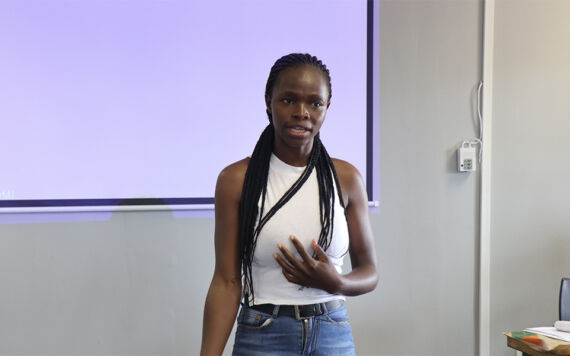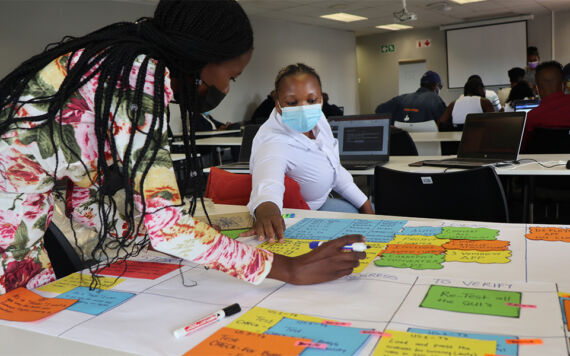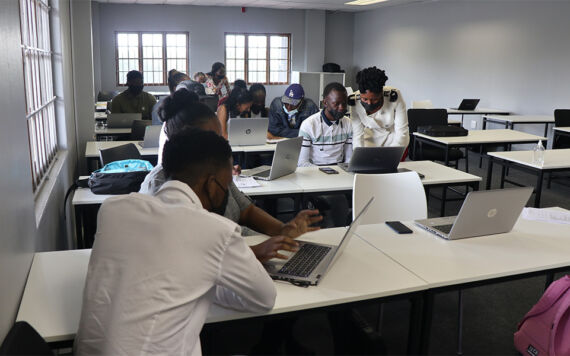| Project Name | Digital Skills for Youth at Risk in South Africa |
| Commisioned by | German Federal Ministry for Economic Cooperation and Development (BMZ) |
| Country | South Africa |
| Implementing Organisation | Afrika Tikkun Services – afrikatikkunservices.com |
| Duration | November 2021 – October 2022 |
The Challenge
High Unemployment of Youth: The unemployment rate for young people below 35 years in South Africa is twice as high as the overall national rate. Many young people lack the requisite level of education as well as basic computer skills to enter the labour market.
COVID-19 Pandemic led to Job Losses: The high unemployment rates have been further exacerbated by COVID-19 as the country recovers from the impact of the pandemic. During the pandemic, the unemployment rate rose drastically, affecting those groups who were already left behind in the labour market: people with lower education, people in poverty, black Africans, and informal workers – with women being disproportionally affacted, putting them at a ‘double disadvantage’.
The Objective
The project aims to reduce the unemployment rate amongst young people in South Africa by creating opportunities and supporting access to the job economy. Disadvantaged youth gain digital capacities and technical skills to be successful in the South African IT sector. In doing so, the project addresses the skills shortage in the ICT sector, while contributing to the empowerment of previously left behind young people.
The Target Group
The programme targets out-of-school, unemployed young people aged between 18 – 35 years from townships and informal settlements in South Africa. Young women are especially targeted for this program as they are particularly vulnerable.

About Afrika Tikkun Services
Afrika Tikkun is a non-profit organisation established in 1994. Its commitment is to holistically develop the lives of young community members. Therefore, a 360° Cradle-to-Career Programme approach was designed to meet the demands of health, education and future wellbeing of South Africa’s impoverished youth. The operational sectors of TIKKUN cover Education, Agriculture, Business and Professions, Health, Welfare, Housing, Public Relations, Youth and Sport, Art and Culture.
Website: afrikatikkunservices.com
The Approach
Providing Learning Opportunities: Afrika Tikkun equipped five centres and identified further public and private partners and public spaces like libraries or partnering organisations where youth can access to computers, internet and other resources needed to access the training courses.
Career Development and Placement: Four cohorts, each comprising 150 candidates, are trained for twelve months within the Career Development and Placement (CDP) programme. The CDP consists of basic computer skills including general operation and common programmes like MS Word, PowerPoint, Excel, and Outlook. The second training step covers digital skills such as information generation and communication. Also, virtual collaboration tools and cloud-based platforms are provided for cooperation and communication purposes.
Employment Opportunities and Work Placements: After gaining the basic skills, the participants are trained in the most highly ranked in-demand professional IT roles in South Africa which are Desktop Support Technician, Junior Software Developer and Data Analyst. Therefore, Afrika Tikkun has identified several IT companies that will host candidates for work experience in selected fields once they have completed their training.
Achieved Results
- 651 disadvantaged young people are trained in work readiness and ICT tracks
- 475 young people were successfully placed in jobs
- 475 participants earn at least a minimum wage
- 290 participants passed their optional certification
Onyinye Nwaneri
Chief Executive Officer
Afrika Tikkun Services
In the context of sustainable development, what do you consider the greatest challenge that you help to overcome in your country? What is special about your project and approach, with regard to the context in which it is located?
Young people are the most vulnerable in the South African labour market today, with the unemployment rate in this age group reaching up to 61% in 2022. This staggering youth unemployment rate is cause for grave concern, not only because young people excluded from participating in the labour market, but also because it denies them their right to work towards income security, so are unable to lead lives of dignity. By providing young people with soft and technical skills, together with practical, on-the-job training in various industries and sectors, our programme helped to increase their employability and economic opportunities. This, in turn, contributed to reducing poverty, promoting decent work, and supporting economic growth.
Let’s get specific: What was your most significant project success? What was especially important/notable? What are you particularly proud of having achieved?
The goal for this project was to address the issue that our youth, already vulnerable within the labour market, were at increasing risk of being left behind, so we set out to equip 600 candidates with the skills needed to enter the digital economy. The achievement we are most proud of is that of the 544 young people that completed the programme, to date 328 have secured an employment contract of at least 12 months and a further 147 have secured a permanent job. What is important to note is that this opportunity has not only changed the trajectory of the lives of those that graduated from the information and communications technology (ICT) training programme, but also the lives of their families and their children, by breaking the cycle of intergenerational poverty.
What have you learned and what experiences would you like to share with like-minded actors/practitioners?
The project gave us the opportunity to learn a number of valuable lessons that we have incorporated into our new programmes. These include: (1) The success of the programme is determined at the recruitment stage, so it is imperative that potential participants have an interest in, and the ability for, a career in ICT. (2) Equipping candidates with multiple skills in addition to the core in-demand skill they have been trained in, so that they bring added value to potential employers. (3) Encouraging candidates to complete vendor exams and provide the support needed for them to pass, as youth with internationally recognised certificates secure better paying employment opportunities.







